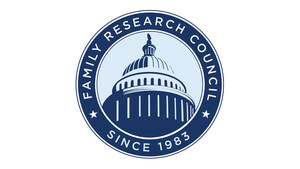WASHINGTON, Dec. 15, 2010 /PRNewswire-USNewswire/ -- Only 45 percent of American children have spent their childhood in an intact family, according to the Index of Belonging and Rejection. Fifty-five percent of American teenagers' parents have rejected each other, either through divorce, separation, or choosing not to marry.
(Logo: http://photos.prnewswire.com/prnh/20080930/FRCLOGO)
The Index, produced by Pat Fagan, Ph.D. of the Marriage and Religion Research Institute, a project of Family Research Council, defines an intact family as a biological mother and father remaining legally married to one another since before or around the time of their child's birth.
"American society is dysfunctional, characterized by a faulty understanding of the male-female relationship," said Dr. Pat Fagan. "Our culture needs a compass correction, learning again how to belong to each other when we have begotten children together. If we fail in this, as a nation we will continue to 'define deviancy down,' in the inimitable phrase of Daniel Patrick Moynihan.
"The merging again of the realities of father and mother with those of husband and wife will strengthen our children and lead to immeasurable benefits for children, adults and society. These include financial, educational, legislative, legal and judicial gains," said Fagan.
"Significant variations in the capacity to belong occur across regions and within different ethnic groups," according to the Index's analysis of the 2008 American Community Survey.
- 62 percent of Asian-American teenagers live with both married parents.
- 54 percent of white youth, a slight majority, live with both parents.
- 41 percent of teenagers from multiracial family backgrounds live in intact families.
- 40 percent of Hispanic teenagers nationwide live with both parents.
- 24 percent of American Indian and Alaskan Native adolescents—fewer than one in four—have lived with both married parents throughout childhood.
- 17 percent of African-American youth—fewer than one in five—live with both married parents.
Beyond racial differences, the Index varies across regional and socioeconomic lines. Forty-one percent of adolescents living in the South grow up belonging to an intact family. Furthermore, large urban counties whose populations are less educated, less affluent, and contain high concentrations of minority groups tend to have lower proportions of two-parent families.
"Individual children, communities, and the nation as a whole suffer the consequences of the culture of rejection in American homes," Fagan said. "Children in broken homes are more likely to be poor or welfare-dependent. They enjoy less academic achievement and less social development, have more accidents and injuries, and have worse mental health and more behavioral problems. These children also have worse relationships with their parents and are more likely to reject their own spouses later.
"The culture of rejection burdens communities with higher levels of poverty, unemployment, welfare dependency, domestic abuse, child neglect, delinquency, crime and crime victimization, drug abuse, academic failure and school dropout, and unmarried teen pregnancy and childbearing. The United States experiences increased costs in education, healthcare, mental health and the administration of justice.
"Our future as a country depends on the strength of our families. Such strength is waning, which should give every American pause for concern and motivation for action," Fagan concluded.
To download a copy of the Index of Belonging and Rejection, click here, or visit http://downloads.frc.org/EF/EF10L25.pdf.
SOURCE Family Research Council
WANT YOUR COMPANY'S NEWS FEATURED ON PRNEWSWIRE.COM?
Newsrooms &
Influencers
Digital Media
Outlets
Journalists
Opted In





Share this article